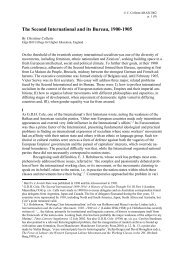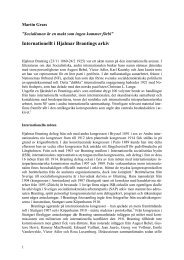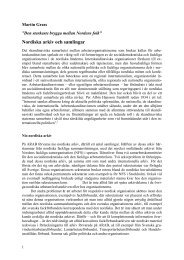Communism, Social Democracy and the Democracy Gap
Communism, Social Democracy and the Democracy Gap
Communism, Social Democracy and the Democracy Gap
You also want an ePaper? Increase the reach of your titles
YUMPU automatically turns print PDFs into web optimized ePapers that Google loves.
© S. Berger/ARAB 2002<br />
p. 6 (14)<br />
democracy as <strong>the</strong> party’s most important aims. 26 But also in countries well-known for<br />
<strong>the</strong>ir more illiberal traditions, <strong>Social</strong> Democrats often held up <strong>the</strong> values of liberal<br />
democracy. In July 1933 Otto Bauer called on fellow Austrian socialists not to lose sight<br />
of <strong>the</strong> fact that <strong>the</strong> establishment of a dictatorship of <strong>the</strong> proletariat was out of <strong>the</strong> question<br />
amidst rising fascist dictatorships. Instead, he argued: ‘<strong>the</strong> decision will be made today not<br />
between democracy <strong>and</strong> <strong>the</strong> dictatorship of <strong>the</strong> proletariat, but between democracy <strong>and</strong> <strong>the</strong><br />
dictatorship of fascism.’ 27 Especially in <strong>the</strong> inter-war period a range of unstable<br />
democracies re-enforced <strong>the</strong> general concern of <strong>Social</strong> Democrats with class <strong>and</strong> <strong>the</strong> class<br />
struggle ra<strong>the</strong>r than with democracy per se. A relentless class struggle from above seemed<br />
to destroy bourgeois democracy in many of <strong>the</strong> newly founded democratic regimes of<br />
central <strong>and</strong> eastern Europe. Could bourgeois democracy <strong>the</strong>refore ever deliver socialism<br />
Many <strong>Social</strong> Democrats continued to cling to this belief, although significant minorities<br />
within <strong>Social</strong> Democratic parties begged to differ. Ultimately <strong>the</strong> united <strong>and</strong> popular fronts<br />
of <strong>the</strong> 1930s were all based on <strong>the</strong> lowest common denominator: a defence of democracy<br />
against <strong>the</strong> advancing forces of fascism.<br />
In <strong>the</strong> more stable conditions under <strong>the</strong> post-1945 Pax Americana in Western<br />
Europe <strong>Social</strong> Democratic notions of democracy became limited to parliamentary<br />
representation, <strong>the</strong> rule of law <strong>and</strong> <strong>the</strong> championing of <strong>the</strong> rights of <strong>the</strong> individual. In<br />
particular <strong>the</strong> Swedish road to socialism now became a model for many <strong>Social</strong> Democrats<br />
in Western Europe. The Swedish <strong>Social</strong>ist Workers' Party (SAP) was arguably <strong>the</strong> first<br />
<strong>and</strong> <strong>the</strong> most successful <strong>Social</strong> Democratic Party in accepting <strong>and</strong> practising pluralist<br />
democratic power politics in <strong>the</strong> early 1930s. They had forged an important alliance with<br />
<strong>the</strong> Agrarian Party (representing largely agricultural interests) <strong>and</strong>, while in government,<br />
began to experiment with Keynesian anti-cyclical economic policies. Within <strong>the</strong><br />
framework of <strong>the</strong> liberal constitutional order <strong>and</strong> <strong>the</strong> democratic state, Swedish <strong>Social</strong><br />
Democrats set out to manage capitalism more effectively <strong>and</strong> produce a 'capitalism with a<br />
human face'. The SAP was convinced that democracy <strong>and</strong> cross-class alliances were <strong>the</strong><br />
key to a socialist society of <strong>the</strong> future. Its leading <strong>the</strong>oreticians, such as Hjalmar Branting,<br />
Ernst Wigforss <strong>and</strong> Per Edvin Sköld were also its leading politicians, <strong>and</strong> <strong>the</strong>y shared a<br />
fundamental belief in <strong>the</strong> liberal democratic state's ability to deliver socialism.<br />
If <strong>the</strong> Communist notion of democracy was <strong>the</strong> thinnest of fig leaves for<br />
dictatorship, <strong>the</strong> <strong>Social</strong> Democratic notion of democracy became increasingly narrowed<br />
down to liberal versions of representative democracy. What increasingly moved out of<br />
sight between <strong>the</strong> dominant Communist <strong>and</strong> <strong>Social</strong> Democrat historiographies were<br />
notions of democracy that had been present among groups of socialists who did nei<strong>the</strong>r fit<br />
<strong>the</strong> Communist nor <strong>the</strong> <strong>Social</strong> Democrat paradigm. To start off with, <strong>the</strong>re is <strong>the</strong> history of<br />
<strong>the</strong> early labour movement which preceded <strong>the</strong> setting up of 'proper' <strong>Social</strong> Democratic<br />
parties. This history is all too often treated as a mere pre-history in <strong>the</strong> Communist <strong>and</strong><br />
<strong>Social</strong> Democrat narratives. Yet <strong>the</strong>irs is often a different history from that of <strong>the</strong> later<br />
mass socialist parties. In Britain, for example, <strong>the</strong> radical working-class Chartist<br />
organisations of <strong>the</strong> 1830s <strong>and</strong> 1840s formulated aspirations for a more democratic polity<br />
which were taken up by some socialist groups in <strong>the</strong> closing decades of <strong>the</strong> nineteenth<br />
century but became marginal within <strong>the</strong> mainstream Labour Party after 1906. 28 In<br />
26 Dietrich Orlow, Common Destiny. A Comparative History of <strong>the</strong> Dutch, French <strong>and</strong> German <strong>Social</strong><br />
Democratic Parties, 1945-1969 (Oxford 2000), p. 21.<br />
27 Otto Bauer, ‘Um die Demokratie’, Der Kampf, vol. 26 (July 1933), 270. Cited in: Gerd-Rainer Horn,<br />
European <strong>Social</strong>ists Respond to Fascism. Ideology, Activism <strong>and</strong> Contingency in <strong>the</strong> 1930s (Oxford 1996),<br />
p. 22.<br />
28 Logie Barrow <strong>and</strong> Ian Bullock, Democratic Ideas <strong>and</strong> <strong>the</strong> British Labour Movement, 1880-1914<br />
(Cambridge 1996).
















